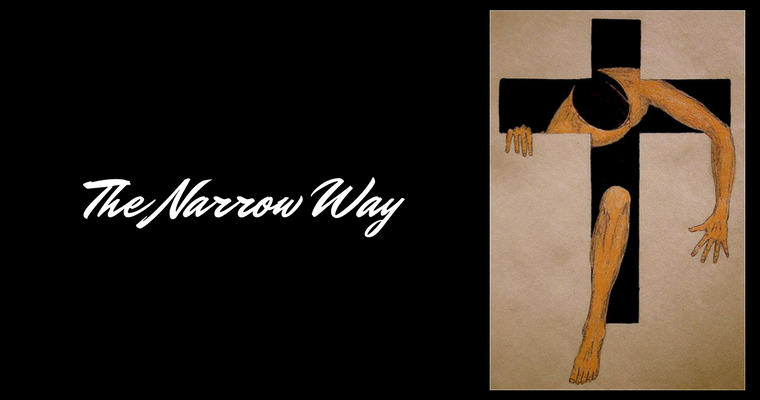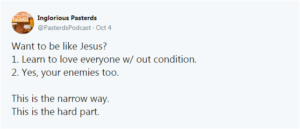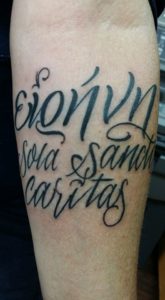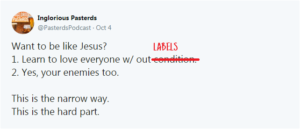The Narrow Way

Caveat: This message was written to deliver to the candidates and deans at the closing vesper service for the 2017 Local Pastor Licensing School of the Holston Conference of the United Methodist Church. The first time you preach to a room full of preachers is a bit unnerving, and I was terrified. Although the message was fully delivered (totally the Spirit’s doing), it was not delivered in the order it was written. My apologies to my classmates reading this after the fact.
Scripture:
Matthew 7:13-14 – The Voice – 13 There are two paths before you; you may take only one path. One doorway is narrow. And one door is wide. Go through the narrow door. For the wide door leads to a wide path, and the wide path is broad; the wide, broad path is easy, and the wide, broad, easy path has many, many people on it; but the wide, broad, easy, crowded path leads to death. 14 Now then that narrow door leads to a narrow road that in turn leads to life. It is hard to find that road. Not many people manage it.
The Word of God for the people of God. (response)
May the words of my mouth and the meditations of our hearts be pleasing unto you, O Lord, our Rock and Redeemer. Amen.
I was so excited that the last vesper service we would have together slot was open when the paper came around. I wanted the slot. I envisioned a message that would send us off in the spirit of #2279 in The Faith We Sing, “Trees of the Field” also known as “You Shall Go Out with Joy” or UMH 667, Shalom Chaverim (Farewell, Dear Friends). Upbeat and joyful, congratulatory and triumphal. After all, we survived licensing school! Yay, us!
I feel it’s only fair that I tell you all the Spirit is A) usually pushing me to talk about anything but what I planned to talk about and B) a technophile who often feeds me inspiration through social media posts, user profiles, faxes from Jewish Rabbis living in Florida, and by taking possession of my car stereo and/or music apps on my phone.
Spirit, God love her, gave me a “tweet” for this evening’s message. For those not familiar with tweets, you tweet on Twitter and, while rare, some tweets are “profound, noteworthy, thought provoking, or otherwise powerful statements made in 140 characters or less.” The tweet that she put under my nose said this:
Want to be like Jesus?
1. Learn to love everyone w/out condition.
2. Yes, your enemies too.
This is the narrow way.
This is the hard part.
That was it. No additional explanation by the author(s), no discussion, no “unpacking” of the scripture. Just that simple little 140 character message.
I was confused by why Spirit would bring me back to this when she and I had just done a message on October 1 about Eiréné, peace … God’s gift of wholeness, passing the peace, our role as peacemakers, what I needed to do to find and rest in God’s peace, about how the main obstacle to my own peace was failing to really, genuinely, sincerely love others … any others … even myself … as he loves me, and my need to pray for and receive Sola Sancta Caritas (only holy love) so that I could better love others.
And, of course I want to be like Jesus. I don’t just want to be like him, I need to be like him. I mean, it would be kind of weird to (hopefully) become a pastor and not “be like Jesus” as much as humanly possible, amen?
I was figuratively scratching my head and questioning whether this was really the Spirit talking to me when, about that time, the Hillsong tune, Oceans, popped into my head. You know the one:
“Spirit lead me where my trust is without borders, Let me walk upon the waters Wherever You would call me. Take me deeper than my feet could ever wander, and my faith will be made stronger In the presence of my Savior.”
I groaned. Audibly. If you’ve listened to K-Love or Air-One over the last 3-4 years, you know that Oceans is a bit overplayed. It was clearly time for Spirit and me to have a little talk.
Me: “Why are you bringing me back here, and will you puh-leeeeze not play that song in my head anymore?”
Spirit: “Because you aren’t practicing what you preached, and I like that song. So, consider not getting it out of your head penance for not practicing what you preached.”
 Me: “Not practicing what I preached? I’m so committed to peace and loving everyone and I mean everyone, I actually had Eiréné and Sola Sancta Caritas tattooed on my arm! See?!”
Me: “Not practicing what I preached? I’m so committed to peace and loving everyone and I mean everyone, I actually had Eiréné and Sola Sancta Caritas tattooed on my arm! See?!”
Spirit: “That’s not good enough. Just talking about doing it isn’t the same as doing it. Just writing it permanently on your arm is a nice reminder, but it’s you that has to walk that talk. It’s you that has to make peace happen, it’s you that has to show love for all without condition.”
Me: “I’m trying to do that!”
Spirit: “Oh, really.”
I could hear her eyes rolling. She went on,
Spirit:“What did you call the guy that cut you off in traffic as you left church that day? How about your *koff* favorite politicians every day since? And what do you always call Jay Leno? Where was the unconditional love in any of that?”
You would think I would learn not to argue with her. I never win.
It’s that without condition part that trips us up, isn’t it? We’re about to go out from here, some of us back to our appointments, others of us waiting to hear if we’ll be appointed, all of us back into the world, and we have to be walking, talking, living role models of loving others without condition, of actual peacemakers in a world that is anything but peaceful.
Last session, we all failed the peacemaker test right here in this group. We all failed to be peacemakers to one another: Some of us – especially myself – openly, verbally, and some of us through our silence. Now, this is purely speculative, but I’m guessing that, based on the last session, we may be failing that test more often than we’re passing it. I know that I have been. One thing I’m betting we all did subconsciously that day was firmly affix labels on each other. And if we’re doing that here, we’re doing it everywhere to everyone.
The Number One step to being like Jesus according to that tweet, however, was, “Learn to love everyone without condition.”
 What if one of those “without condition” conditions was the very labels we make for each other? Labels like conservative, liberal, progressive, literalist, democrat, republican, racist, fascist, socialist, woman, feminist, hawk, pacifist, gay, straight, trans, colored, white, believer, non-believer … I’ll skip the more derogatory labels, but we all – at minimum – occasionally think them about someone we know or encounter, amen?
What if one of those “without condition” conditions was the very labels we make for each other? Labels like conservative, liberal, progressive, literalist, democrat, republican, racist, fascist, socialist, woman, feminist, hawk, pacifist, gay, straight, trans, colored, white, believer, non-believer … I’ll skip the more derogatory labels, but we all – at minimum – occasionally think them about someone we know or encounter, amen?
And we apply them, silently, to one another based on a whole bevy of observations we make about each other, such as attitudes, ideologies, beliefs, yard signs, flags hanging from front porches, lifestyle choices, tattoos, hobbies, membership in organizations, bumper stickers, living conditions, race, culture … a host of labels to choose from and hand out.
Think about those labels for a moment. You do realize that a label is far more than just a word on a sticky “Hello, my name is” square, don’t you? The word “label” is really just an abbreviation of all the things we attach to those labels. When we label someone, we judge them, we form a silent opinion of them, we categorize them into friend or foe, we drag up every stereotype the label carries … You need a suitcase to carry all the stuff that goes with each label. Heck, some labels might even need steamer trunks.
Sometimes, we give more than one label to a person. You might be carrying 1-10 suitcases per person, dependent on the number of labels you’ve assigned them. That’s a lot of baggage to tote just for the labels we place on others.
If we’re toting all that baggage, how are we ever going to navigate the difficult narrow way and go through that Narrow Gate?
But navigating the difficult narrow way is what we’ve been specifically called to do. In fact, not just to travel the narrow way and enter through the narrow gate ourselves, but to lead those we shepherd through it as well.
Labels, to me, are the greatest sin I can commit. They lack integrity because I can assign a label to someone without that person ever knowing I labeled them. They’re silent killers of relationships, connection, hopes and dreams. They’re divisive and damaging when spoken out loud. They’re hurtful. They’re harmful. They’re horrible.
Learn to love everyone without condition. That’s the narrow way. That’s the hard part.
Remember that John wrote in 1 John 4:8,
“God is love.”
Remember also that Paul defined love for us in 1 Corinthians 13:4-8,
“Love is patient, love is kind. It does not envy, it does not boast, it is not proud. It does not dishonor others, it is not self-seeking, it is not easily angered, it keeps no record of wrongs. Love does not delight in evil but rejoices with the truth. It always protects, always trusts, always hopes, always perseveres. Love never fails.”
Since God is love, it’s safe to assume God is all those things in Paul’s definition of love.
Shouldn’t we be all those things as well? Shouldn’t we be patient, kind, without envy or boast, humble? Aren’t we called to not dishonor others, to not be self-seeking, easily angered, to keep no record of wrongs? And, yet, we continue to label …
And I know that it’s hard. I’m living testimony to both the difficulty in it and the fact that we can learn to love unconditionally …
I grew up with a father that was a closet racist simply out of lack of knowledge and understanding of the people he was denigrating, and because his daddy was a racist. I grew up a racist who resented American Indian kids in college because I believed they were getting a free ride and who’d been taught to believe that a messy yard meant “it looks like a bunch of Mexicans live here.” God used my grandfather to send my mother a box of family papers and old letters and, well, guess who found out she was, in part, the very label she hated … Indian. God gave me red ancestors. I spent the next roughly 20 years learning not only about them, but to love and embrace that part of me. It was a Muskogee Creek elder that taught me how to read the scripture in a way that I could understand, and my longhouse elders that taught me what “connection” really means.
But God wasn’t done with me. God went on to give me red and brown and black grandchildren and all that comes with them to love, to learn with, to embrace.
I was a small town girl for the first half of my life from very rural parts of the country, living almost exclusively in towns with populations of 900 or less. I didn’t know anyone who was gay. It wasn’t something anyone talked about … except for calling each other a certain name when one was angry or being a bully. I was homophobic and God gave me a gay child to love. It took some time and I’m the one that had to learn to understand and to accept her, but eventually I did.
I resented addiction and alcoholism. I watched those two behaviors tear my family apart more than once. I didn’t understand why people I loved kept letting their alcoholic spouses cause them so much grief, or their addicted kids steal from them again and again and again. Why couldn’t they just stand up for themselves and say, “Enough! Be gone! I deserve better!”
Then God gave me a child who self-medicates with alcohol so I would understand that, no matter what he’d done, no matter what he said, he’s always my child that I love, that forgiveness isn’t a one shot deal, and that unconditional love doesn’t come with an on-off switch.
God gave me firsthand experience in loving all these people in spite of the labels I had given them. If I can love these children and grandchildren of mine, how much greater is God the Father’s love for all of us? If God can love everyone, surely we can, too. Real love. Genuine love. Label-free love.
Remember when we leave here this afternoon and return to our appointments, our home churches, our neighborhoods, our communities … remember to drop the baggage of labels – silent or spoken – and see people through the lens of God’s eyes, not our own.
Remember to love everyone without condition and, yes, your enemies, too, because that is the narrow way. That is the hardest part.
Let’s pray:
Father God, Creator of heaven and earth, sea and sky, and all that flows, grows, crawls, walks, swims and flies upon it, You have created each of us – called and yet to be called, saint and sinner alike – in Your image, and we thank You, God, for loving us when we are clearly undeserving.
Today, God, we stand before You and ask Your mercy and forgiveness. Please, Lord, help us empty ourselves of the ways, the labels, the opinions, and the anger of the world, and fill us so full instead with Your blessed holy love that we glow like candles in the darkness to all others who desperately need to see You, to know You, and to know Your love.
As we prepare to leave here tonight, hold us to the Narrow Way, Lord, and teach us Your ways. Strengthen us for Your work. Lead us where You would have us follow.
Fill us with holy love, God, and bless us with eiréné – with Your gift of wholeness, Your peace. Guide us to become the peacemakers for this, our time, in Your Kingdom on earth.
In Jesus’ name we pray. Amen.
Benediction (Samuel A. Trumbore, UUA; modified by V. Ohle):
Christ said, “Peace I leave with you; my peace I give you.”
From Sunday to Sunday, we gather in spaces made sacred by His presence in order to find peace. Each time, our words and music offer and celebrate peace with the hope of instilling it in others and ourselves.
Renewed in our faith and inspired to act, let us be the peacemakers the world aches for; and, by being peacemakers, let us find the peace we long for. As we leave this sacred space a final time tonight, take the peace you have found here back out into the world with you. As the Father sent Him, He is sending you.
Go in peace. Make peace. Be at peace. Peace be with you.
Feature Image Credit: “The Cross, The Narrow Way” by David Hayward, The Naked Pastor, patheos.com/blogs/nakedpastor
David was baptized Anglican as a baby, came to faith in a Baptist church when he was a teenager, changed to Pentecostal in his late teens, married another Pentecostal named Lisa, was ordained Presbyterian, pastored a Vineyard church, and planted others. He has a Masters in Theological Studies from Gordon-Conwell Theological Seminary, as well as a Diploma in Religious Studies and Ministry from McGill University in Montreal. In 2010 David left the professional paid clergy. He is still passionate about how people can find and follow their own spiritual path with courage and joy, as well as in how people can freely gather and form community in healthy ways. David started a blog called nakedpastor in 2006, and initiated his public analysis of religion, religious community and spirituality through his writings, art and cartoons. Thousands of people are challenged and entertained by nakedpastor every day. In 2012, David launched The Lasting Supper, an online resource site and community for the spiritually independent. His art, cartoons, writings and book have found their way all around the world. David lives with his wife Lisa on the beautiful Kennebecasis River near Saint John, New Brunswick, Canada. They have 3 grown children close by.
You must be logged in to post a comment.